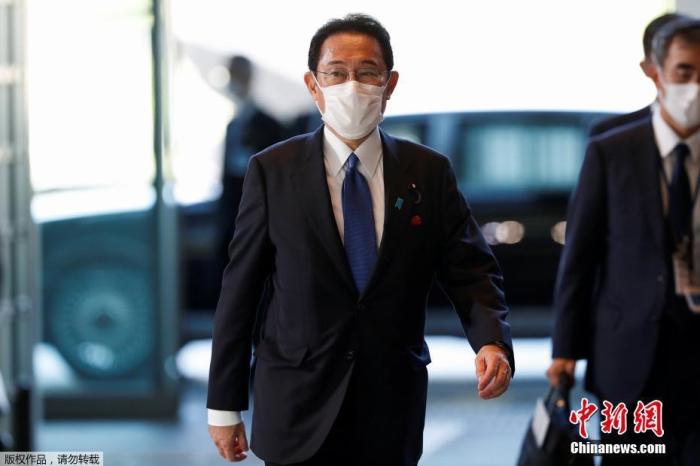Chinanews, October 15th, a comprehensive report, Japan's ruling and opposition parties actually entered an electoral battle after the dissolution of the House of Representatives on the 14th. The ruling and opposition parties will decide the outcome in the shortest 17 days after World War II.
In addition to the new crown epidemic response and future economic policies will become points of contention, the political postures of the two administrations of Abe and Yoshihide Suga, which have lasted for nearly nine years, will also be tested.
Prime Minister Fumio Kishida expressed his determination to win the victory of the Zimin and Komei parties and continue to govern.
The leader of the Cadet Party, Yukio Noo, called for an end to the politics of the "Liberal Democratic Party".
On October 4, local time, Fumio Kishida, President of the Japanese Liberal Democratic Party, was elected as the 100th Prime Minister after being named by the Prime Minister in a plenary session of the House of Representatives.
The picture shows Fumio Kishida (middle) standing up to thank him.
The shortest decisive battle after World War II!
17 days victory in the House of Representatives election
The Japanese House of Representatives was formally dissolved on the 14th, and votes were counted on the 31st.
The House of Representatives election is at stake for the ruling power, whether the Liberal Democratic Party and the Komeito coalition can continue to govern, or whether the opposition parties can eventually promote a party rotation. The ruling and opposition parties will decide the outcome in the shortest 17 days after World War II.
Japan's "Yomiuri Shimbun" reported that the ruling party originally coordinated with "announcement on October 26 and voting on November 7", but Prime Minister Fumio Kishida finally decided to hold the House of Representatives election one week in advance.
From the dissolution of the House of Representatives on the 14th to the voting on the 31st, it was only 17 days, the shortest record since World War II.
According to a poll conducted by the Yomiuri Shimbun from the 4th to the 5th, Kishida’s approval rate is about 56%, which is much higher than the 31% at the end of the cabinet of former Prime Minister Yoshihide Suga. The ruling party hopes to "celebrate the market" in the Kishida cabinet. Before the crash, the House of Representatives election was completed.
In addition, Kishida also considered completing the re-election when the new crown epidemic slowed down, which has become one of the main reasons for early voting.
The majority opinion in the Liberal Democratic Party believes that "as long as the epidemic resumes, the support rate will immediately decline."
According to analysis, former Prime Minister Shinzo Abe won the House of Representatives election in 2014 and 2017 in a "short-term decisive battle", which made Kishida also want to replicate Abe's successful experience.
On October 4, local time, Fumio Kishida, President of the Japanese Liberal Democratic Party, was elected as the 100th Prime Minister after being named by the Prime Minister in a plenary session of the House of Representatives.
The picture shows Fumio Kishida arriving at the Prime Minister's residence.
Kishida shows determination to win
The ruling and the opposition strengthen the showdown posture
Regarding the decision of Japanese Prime Minister Fumio Kishida to dissolve the House of Representatives, the ruling party expressed its support on the 14th. The Liberal Democratic Party stated to Chairman Hiroshi Moriyama that “this is an extremely appropriate decision”; opposition parties criticized that it focused on finance within a short period of time as prime minister. Propositions such as income taxation were shaken, and the ruling and opposition parties stepped up their confrontational stance toward this political decisive battle.
Kishida held a press conference at the official residence in the evening and said that he would be foolproof in response to the epidemic and economic countermeasures.
He referred to the general election as "the election of the future," and proposed that the dividing line between victory and defeat is for the ruling party to obtain more than half of the seats.
In addition, he said that "this country cannot be handed over to opposition parties."
In an interview, Tetsuro Fukuyama, secretary-general of the opposition Cadet Party, replied: "What is the reason for the vacillation in speeches on the strengthening of taxation of financial income? Without explaining the reason, the people will not accept it. I hope that the vacillating prime minister and The head of the firm Liberal People's Party, Yukio Noo, made a choice." The chairman of the political politician, Kenta Izumi, pointed out at the press conference: "The prime minister's momentum is dim and his successor is weak. This is a dissolution that can't be done."
In an interview, Secretary of the Communist Party Secretary Koike Akira also emphasized: "The parliamentary deliberations in just three days have revealed the Prime Minister's vacillating posture. In the House of Representatives election, the appeal will be entrusted to the coalition power of the opposition parties."

